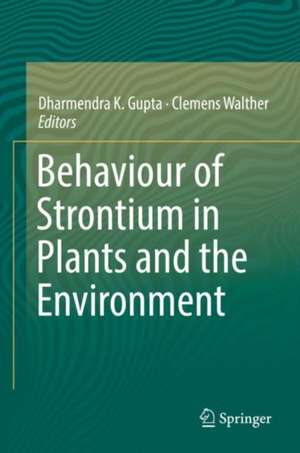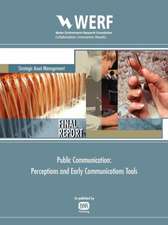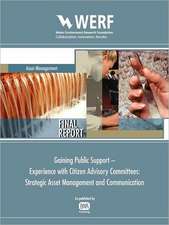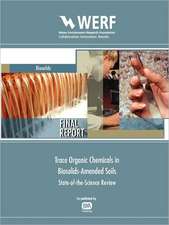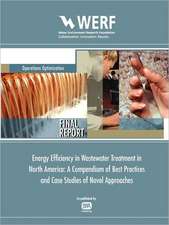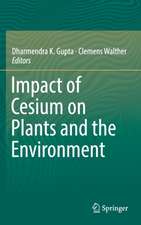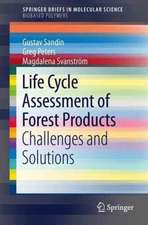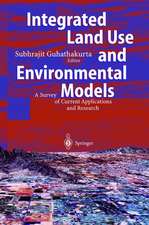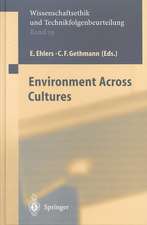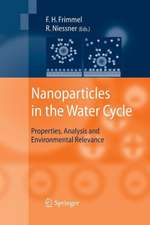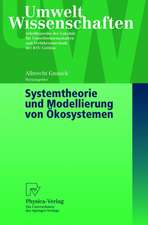Behaviour of Strontium in Plants and the Environment
Editat de Dharmendra K. Gupta, Clemens Waltheren Limba Engleză Hardback – 8 noi 2017
This book will inform graduate and undergraduate students who are specializing in radioecology, especially strontium uptake via soil to plants, safe disposal of strontium waste, remediation legacies and impact of strontium waste material on the natural and manmade environment. A broad overview of reviews is provided covering a number of original publications on strontium plant uptake, including case studies that present the latest technological developments and future trends for investigating strontium mobility in soil and treatment of strontium contaminated areas.
| Toate formatele și edițiile | Preț | Express |
|---|---|---|
| Paperback (1) | 550.21 lei 38-44 zile | |
| Springer International Publishing – 22 iun 2018 | 550.21 lei 38-44 zile | |
| Hardback (1) | 641.03 lei 43-57 zile | |
| Springer International Publishing – 8 noi 2017 | 641.03 lei 43-57 zile |
Preț: 641.03 lei
Preț vechi: 754.15 lei
-15% Nou
Puncte Express: 962
Preț estimativ în valută:
122.68€ • 127.60$ • 101.28£
122.68€ • 127.60$ • 101.28£
Carte tipărită la comandă
Livrare economică 14-28 aprilie
Preluare comenzi: 021 569.72.76
Specificații
ISBN-13: 9783319665733
ISBN-10: 3319665731
Pagini: 170
Ilustrații: XII, 170 p. 43 illus., 21 illus. in color.
Dimensiuni: 155 x 235 mm
Greutate: 0.44 kg
Ediția:1st ed. 2018
Editura: Springer International Publishing
Colecția Springer
Locul publicării:Cham, Switzerland
ISBN-10: 3319665731
Pagini: 170
Ilustrații: XII, 170 p. 43 illus., 21 illus. in color.
Dimensiuni: 155 x 235 mm
Greutate: 0.44 kg
Ediția:1st ed. 2018
Editura: Springer International Publishing
Colecția Springer
Locul publicării:Cham, Switzerland
Cuprins
Chapter 1. Strontium in the ecosystem: Transfer in plants via root system.- Chapter 2. Factors influencing the soil to plant transfer of strontium.- Chapter 3. Distribution of strontium in soil: interception, weathering, speciation and translocation to plants.- Chapter 4. Assessment of entry of 90Sr into plants in case of a heterogeneous radiation contamination of ecosystems.- Chapter 5. Accumulation of 90Sr by plants of different taxonomic groups from the soils at the East Ural Radioactive Trace.- Chapter 6. Soil-to-crop transfer factors (TFs) of alkaline earth elements and comparison of TFs of stable Sr with those of global fallout 90Sr.- Chapter 7. 90Sr distribution in system “soil-Scots pine” (Pinus sylvestris L.).- Chapter 8. Contamination of the firewood taken from the exclusion zone of Chernobyl NPP by 90Sr according to data of 2005-2016.- Chapter 9. The behaviour of 90Sr in macrophytes inhibiting water reservoirs in the Belarussian sector of the Chernobyl NPP exclusion zone.- Chapter 10. Strontium isotopes in biological material: a key tool for the geographic traceability of foods and humans beings.
Notă biografică
Dharmendra K. Gupta is Sr. Scientist of environmental biotechnology/radioecology and already published more than 80 refereed research papers/review articles in peer reviewed journals and edited ten books. His field of research includes abiotic stress by radionuclides/heavy metals and xenobiotics in plants; antioxidative system in plants, environmental pollution (radionuclides/heavy metals) remediation through plants (phytoremediation).
Clemens Walther is professor of radioecology and radiation protection and director of the Institute for Radioecology and Radiation Protection at the Leibniz Universität Hannover. He published more than 100 papers in peer reviewed journals. His field of research is actinide chemistry with a focus on solution species and formation of colloids, ultra-trace detection and speciation of radionuclides in the environment by mass spectrometry and laser spectroscopy.
Clemens Walther is professor of radioecology and radiation protection and director of the Institute for Radioecology and Radiation Protection at the Leibniz Universität Hannover. He published more than 100 papers in peer reviewed journals. His field of research is actinide chemistry with a focus on solution species and formation of colloids, ultra-trace detection and speciation of radionuclides in the environment by mass spectrometry and laser spectroscopy.
Textul de pe ultima copertă
This book provides extensive and comprehensive knowledge to researchers and academics who work on strontium contaminated areas. Topics covered include impact on plants and environment, as well as remediation strategies.
This book will inform graduate and undergraduate students who are specializing in radioecology, especially strontium uptake via soil to plants, safe disposal of strontium waste, remediation legacies and impact of strontium waste material on the natural and manmade environment. A broad overview of reviews is provided covering a number of original publications on strontium plant uptake, including case studies that present the latest technological developments and future trends for investigating strontium mobility in soil and treatment of strontium contaminated areas.
This book will inform graduate and undergraduate students who are specializing in radioecology, especially strontium uptake via soil to plants, safe disposal of strontium waste, remediation legacies and impact of strontium waste material on the natural and manmade environment. A broad overview of reviews is provided covering a number of original publications on strontium plant uptake, including case studies that present the latest technological developments and future trends for investigating strontium mobility in soil and treatment of strontium contaminated areas.
Caracteristici
Provides recent advancements and overviews for researchers and academicians working on radiostrontium contamination throughout the world Presents the current state of art and knowledge related to strontium uptake in plants via different organs Essential for graduate and undergraduate students specializing in radioecology with emphasis on strontium uptake via soil to plants after the Chernobyl NPP accident
